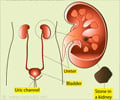- The clinical efficacy and safety of naftopidil 75 mg on benign prostatic hyperplasia patients with moderate or severe urinary disturbance - (https://pubmed.ncbi.nlm.nih.gov/19462821/ )
- Naftopidil for the treatment of lower urinary tract symptoms compatible with benign prostatic hyperplasia - (https://pubmed.ncbi.nlm.nih.gov/30306544/ )
- Safety profile of medication used during pregnancy: results of a multinational European study - (https://www.ncbi.nlm.nih.gov/pmc/articles/PMC5518438/ )
- Outcomes and complications of naftopidil versus tamsulosin for elderly men with lower urinary tract symptoms secondary to benign prostatic hyperplasia: A systematic review and meta-analysis - (https://pubmed.ncbi.nlm.nih.gov/34189764/ )
Naftopidil Medication Information
Discover comprehensive details about Naftopidil, including its pronunciation, uses, dosage instructions, indications, and guidelines on how and when to take it or avoid it.
The updated prescription information covers potential side effects, precautions, warnings, and storage recommendations.
Additionally, explore the Naftopidil brands available in India and internationally, along with pricing information. For personalized advice, consult your healthcare provider.
Generic Name : Naftopidil Pronunciation : Naf-top-i-dil Therapeutic Classification : BPH AgentsBrand Names or Trade Names of Naftopidil
India :
Overview of Naftopidil
• Naftopidil is a selective α1-adrenergic receptor antagonist or alpha blocker used to treat benign hyperplasia of prostate with, lower urinary tract symptoms.Why is Naftopidil Prescribed? (Indications)
Naftopidil is a selective α1-adrenergic receptor antagonist or alpha blocker.Naftopidil is prescribed in Japan for the treatment of benign prostatic hyperplasia (BPH) and benign prostatic obstruction, associated with lower urinary tract symptoms (LUTS), hypertension, cardiac valve disease, and distal ureteral stones.
Further large-scale, randomized, placebo-controlled studies need to be done to see if the naftopidil efficacy and safety data that is applicable to Japanese can be extended to white, black and Hispanic men having LUTS/BPH in western countries.







